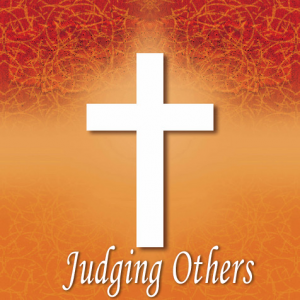Every Sunday, I post a passage of Scripture without commentary. Although I often use Scripture during the week as foundational to my reasoning, I like to let it speak for itself once a week. I trust the Lord will use it to minister to someone; His Word will do that.
Yesterday, though, the passage I quoted was from Matthew 7, part of the Sermon on the Mount, and it centered on judging others. While it speaks quite clearly to me, some may misunderstand its intent simply because it is so often taken out of context. “The Bible says don’t judge” is what we hear, yet that is a misreading of the passage. It pulls out one statement without connecting it to the rest of the verses. I’ll come back to the specifics.
The fact is, we judge all the time. And we should. Jesus said we would know who is genuine and who is not by inspecting the fruit of their lives. In the book of Hebrews, Christians are admonished,
For though by this time you ought to be teachers, you have need again for someone to teach you the elementary principles of the oracles of God, and you have come to need milk and not solid food. For everyone who partakes only of milk is not accustomed to the word of righteousness, for he is an infant. But solid food is for the mature, who because of practice have their senses trained to discern good and evil.
Discernment is essential for Christians; without it, we fall into various traps. We can be led astray, which is why the book of James says,
My brethren, if any among you strays from the truth and one turns him back, let him know that he who turns a sinner from the error of his way will save his soul from death and will cover a multitude of sins.
Common sense: there is truth; one can stray from it; a person who strays from the truth is a sinner and will lose his eternal soul; if anyone points out a man’s sins, he can bring him back to the truth and out of danger of eternal damnation. There’s a whole lot of judging going on in that scenario, and it’s for the good of the man who has gone into error.
 That brings us back to Matthew 7. Verse 1 begins with the warning not to judge because we may be judged for doing so. But in what circumstance? The verses that follow clearly provide the framework: if we are doing the same sort of thing for which we are judging another person, we will be held accountable as a hypocrite. The instruction is plain: you cannot take the speck out of someone else’s eye if you have a log in your own eye. First deal with the problem in your own life, but notice what follows: “and then you will see clearly to take the speck out of your brother’s eye.”
That brings us back to Matthew 7. Verse 1 begins with the warning not to judge because we may be judged for doing so. But in what circumstance? The verses that follow clearly provide the framework: if we are doing the same sort of thing for which we are judging another person, we will be held accountable as a hypocrite. The instruction is plain: you cannot take the speck out of someone else’s eye if you have a log in your own eye. First deal with the problem in your own life, but notice what follows: “and then you will see clearly to take the speck out of your brother’s eye.”
So we are commanded to point out the “speck” once we have dealt with our “log.” This passage is not telling us to ignore the actions, attitudes, and motives of others; it just wants us to do so with a clear conscience.
Christians are to be judgmental. That’s jarring to modern ears saturated with the mantras of self-esteem and non-judgmentalism. Yet it is true. Only by maturely discerning the sins of individuals and our society at large can we begin to take the path to redemption—and redemption is the ultimate goal, is it not?
So check your heart first. Make sure you are not being hypocritical when attacking sin in others. But sin must be highlighted for the good of those who need personal redemption and for the good of a society that is teetering on the brink of total devastation. Christians are to be the salt and light in our world by exposing the darkness and showing the way out of spiritual blindness.
